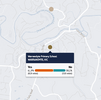sr36
TheBrownDog
Don't know. I haven't seen a breakdown of votes by cultural groups.not everyone is going to have the same view, many however do share Jacintas views. Why did her local community vote NO?. Why did both NT electorates vote NO?
The most well publicised Aboriginal no voters voted no as they felt it embedded authority over Aboriginal communities to the Australian Govt.
Jacinta appears more of the view that Aboriginal Australia should embrace the Australian Government and the opportunities that multicultural Australia gives.
Both valid views in my opinion, but I'm of the view that Aboriginal Australia should be given the opportunity to make those choices for themselves rather than one size fits all - which Jacinta's view encourages.
Im sure there were many other reasons why some voted no.
Last edited:








